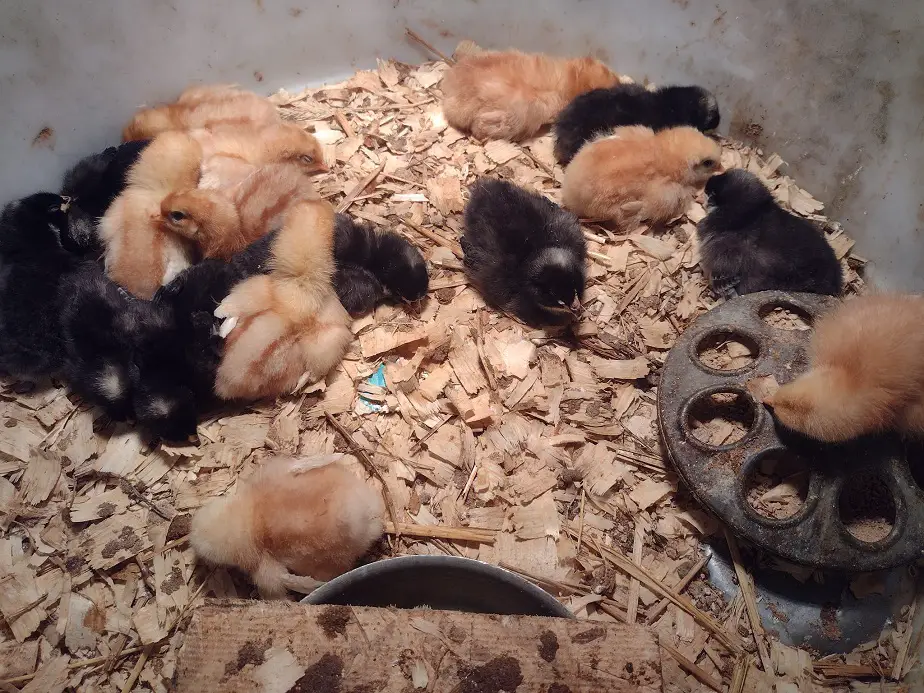Chickens are one of my favorite animals on the homestead.
Chicks do not need medicated feed. Most chicks raised in backyards are not fed medicated feed. Medicated feed is not allowed for organic production and all organic chicken feed is non-medicated. Unmedicated feed is becoming the norm outside of large farming operations.
There is a big argument for medicated feed, yet most people don’t like it. Here’s what’s up.
Why do Chicks get Medicated Feed?
Medicated chick feed is mainly to deal with coccidiosis, which is an intestinal disease caused by common protozoa. The main medication is amprolium, which kills off the protozoa for a while. Large chicken farms often include antibiotics in feed to help deal with e.coli and other problem bacteria.
Coccidiosis is, from time to time, an issue with young chicks, causing digestive problems that can lead to death. The Protozoa is found in the soil and in the gut of most animals. Older chickens don’t have an issue with it, just young chicks once in a while.
Personally, I don’t use medicated feed and never have. I don’t like to go willy-nilly with synthetic drugs. everything has a series of health concerns and side effects. With amprolium, the side effect is thiamin (vitamin B1) deficiency.
A deficiency of thiamine causes issues from weakness and loss of appetite to cerebrocortical necrosis and heart failure. Amprolium can pass from animals to people. Animals treated with the drug can not be eaten (eggs either) until it is after a 4-week withdrawal period. That’s another reason why it’s only given to chicks.
I’ve not had a serious problem with coccidiosis in any of the flocks I’ve had. I have had chicks die at a few days old, usually from getting wet and cold, but nothing from coccidiosis it seems. It’s not a very big concern for me, at least with my chickens. It has been an issue with our rabbits.
Is Medicated Feed Bad for my Chickens?
Chick feed treated with amprolium does not seem to cause any major health concerns to the animal. It is considered the safest drug for the treatment of coccidiosis in chickens, which is why it became so widely used. Generally speaking, the chickens saved from coccidiosis overweighs its possible side effects.
Medicated feed can have a negative impact on the growth and development of chicks. Many experts are not recommending medicated feed unless you see signs of a coccidiosis outbreak, such as mucus in the droppings or weak birds.
The industry standard has been to give medicated feed for the first 2 weeks as a preventative, but some people wait until the chicks are 2 weeks old before giving the preventative regimen.
If you were to try and mix in amprolium to make your own medicated feed, that’s potentially a problem. The stuff has a very fine line between appropriate strength and toxicity. Overdoing it a little could cause horrible problems for your chicks. Pre-mixed feed is properly formulated and should pose no issue.
Giving medicated feed to your chicks is probably fine but people are now leaning away from simply medicating every animal as a preventative. Plus, if you want to use an organic feed, you have to skip the medication. That’s getting very popular these days, and it seems to be just fine.
Preventing and Treating Coccidiosis Without Amprolium ( no medicated feed)
Besides medicated feed, the best way to deal with coccidiosis is to keep your chickens healthy and keep the coop clean. Birds that have filthy living conditions, lack of fresh air and sunshine, or are improperly fed have higher risks of the disease. Keeping feed and water areas clean is especially important.
Coccidiosis vaccination is another option for prevention. Most hatcheries give the option to have chicks vaccinated for coccidiosis, although it’s not common outside of commercial operations. Most small time chicken owners don’t deem to want any of the vaccinations in their birds.
The protozoa that cause coccidiosis lives in the gut, so having too much contact with fresh manure can encourage a higher number of the creatures to incubate and populate in your chickens. That’s why it’s recommended to use a good amount of litter such as stray or woodshavings in the coop.
Dry litter material will help absorb and dry manure and keep it from becoming a problem. Probably the biggest issue is when chickens are pecking in their manure. You can help that by making sure their feed dish and the ground around it is clean. Sweep, brush, or hose down the area when needed.
Clean out the coop or move your chicken tractor regularly. It helps a lot. Probiotics can help prevent an outbreak of coccidiosis by increasing the number of good bacteria in the gut and resetting the gut fauna to a healthy balance.
I like to give fresh greens and fermented feed to my birds to help keep their gut health in top condition. Fresh green grass or leaves are full of good bacteria and the fiber and chlorophyll are good for them anyways. Fermented feed is simple to make and a powerhouse of good gut health.
To ferment feed, all you do is fill a bucket 2/3 with grains or halfway with feed and top it off with water. keep it warm for 2 or 3 days and it’s well-fermented. Give that to your birds every few days to keep them more healthy and help prevent coccidiosis.
Related Articles:

